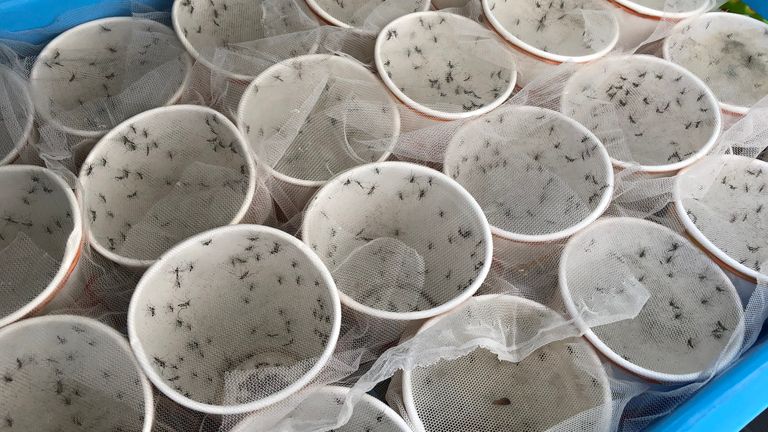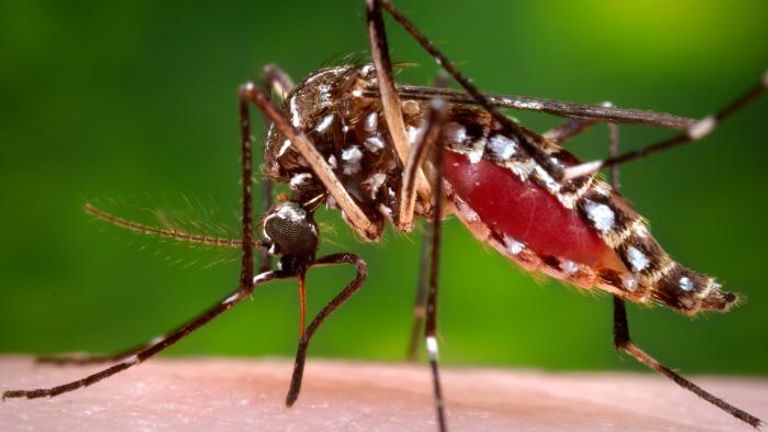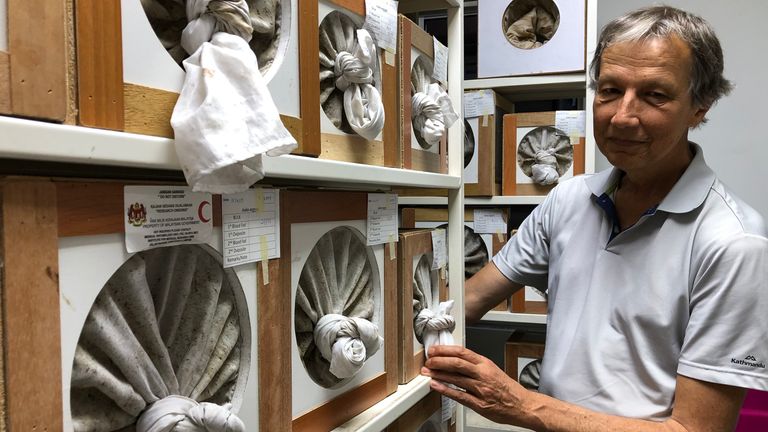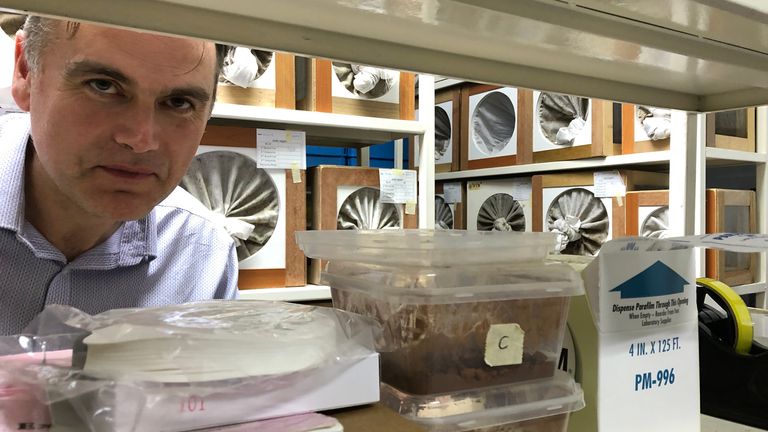Dengue fever: Technique pioneered to tackle disease threatening half the world
Scientists are trying to infect the mosquitoes that spread the virus by injecting them with a bacteria that blocks its dispersal.
Friday 3 January 2020 01:01, UK
Scientists are working on a pioneering programme aimed at tackling one of the world's most damaging diseases.
Dengue fever is a viral infection that can look like severe flu, the symptoms of which include high fever, headache, joint pain and a rash.
A 2013 study found that up to 528 million people are infected with dengue fever every year, up to 96 million of which required medical treatment.
And there is evidence the disease is spreading, with some experts predicting it could be present in western Europe, and even the UK, in the coming decades.
At the Institute for Medical Research in the heart of Kuala Lumpur, a team of researchers led by Dr Nazni Wasi Ahmad has scientifically engineered the aedes aegypti mosquito, which is common in urban parts of South East Asia and a carrier of dengue.
Scientists have discovered that injecting aedes aegypti eggs with a naturally occurring bacteria called wolbachia stops the growth of dengue virus in the female mosquitoes from those eggs.
And if those mosquitoes aren't getting dengue, then crucially, they can't transmit it to humans.
When two mosquitoes carrying the wolbachia bacteria mate, their offspring carry it too but if a wolbachia male mates with an uninfected female, the eggs don't hatch.
As a bonus, it also works to reduce the transmission of other viruses including yellow fever, zika and chikungunya.
The team, which includes scientists from the University of Glasgow, started their programme in Malaysia two years ago.
It involves releasing thousands of lab grown mosquitoes in densely populated areas.
The technique they are using is also being rolled out in a number of other areas of the planet where mosquito borne disease is a problem.
One of the traditional ways to combat dengue is fogging - using insecticides to kill the insects - but experts say it isn't a long-term solution.
Instead, this new approach relies on the wolbachia mosquitoes breeding to create a colony that blocks the transmission of the disease.
Professor Ary Hoffmann from the University of Melbourne told Sky News: "I think the potential of this research is absolutely massive. What we've seen now is the initial trial showing a good reduction in dengue, 40% or so.
"That's likely to be much bigger than that as we get areas that are bigger in terms of getting invaded by the wolbachia. So eventually we could actually see quite substantial decreases in dengue of 70%, 80% or more."
They are already seeing a major reduction in one group of apartment blocks. Mentari Court used to be a hotspot for dengue cases.
Four years ago, before the trials started, they had 363 cases. This year that number has dropped to 72.
It takes just two weeks for an egg to become an adult mosquito in these conditions, and one female can lay up to 300 eggs in their short life.
Dengue is surging across South East Asia and can be fatal.
Jenny Martin died in March from complications caused by the disease.
She was 77 and had already been suffering from kidney failure. Her body simply couldn't fight the deadly tropical disease as well.
Her daughter Bernadine Ng-Martin, who lives in a wealthy suburb just outside the Malaysian capital, told Sky News she had no idea Jenny had been infected when she left to go on a cruise. By the time she got home it was too late.
"She was very well. She saw us to the door, said our goodbyes, told us to have a good time. No signs, no indication that she was unwell at all. It was only the day after we left that she started getting the shivers, the chills, the body aches, the diarrhoea."
Jenny's condition deteriorated fast.
"Within the week, she had taken a very bad turn. It's that quick," Bernadine said.
More than 100 people have died this year in Malaysia after contracting dengue.
Sungai Buloh hospital is the regional referral centre for cases.
Aishah Zulkifli, 23, is one of nearly 115,000 Malaysians who have been diagnosed with dengue this year.
"It's much worse than a normal fever," she said. "On the first day I was throwing up everything I ate, even water. I was dizzy and couldn't walk properly."
Dr Yasmin Mohamed Gan said cases have doubled at Sungai Buloh this year.
"When you see dengue infection, you probably see an impact in the community as well as in the hospital and the healthcare system," she said.
"A lot of people tend to take more sick leave. And of course, a lot of young, healthy people get sick."
There's no cure for dengue, so the race is on to find ways to prevent it.
Professor Steven Sinkins from the University of Glasgow is hoping to expand the programme.
"What we're predicting is long-term dengue transmission blocking in those areas," he said.
"The wolbachia will stay at a high level and will actually expand into surrounding areas. So the long-term prospects look very good at the moment."
The World Health Organisation says around half the world's population is now at risk from dengue fever and expects that number to rise, so the team hope these mosquitoes could be the key to saving millions of lives in the future.
As the world's temperature rises, the mosquitoes that can carry dengue are being found in new areas, including Europe.
Some have been found as far north as Switzerland.
People travelling to South East Asia have always been at risk from dengue and other mosquito-borne diseases, but now there's a possibility they could contract it at home.
Prof Hoffmann added: "It means that if someone goes on holiday in Asia and gets dengue and brings it back to Europe, then gets bitten by alpedes albapicta, the Asian tiger mosquito.
"The mosquito can then take that dengue from one person and spread it to another person. So you could see local transmission of dengue."
Higher temperatures accelerate the mosquitoes' breeding cycles, increased rainfall creates more sites for them to breed, and even drought can produce more mosquitoes as they lay eggs in water storage containers.
The battle to stop dengue fever is only just beginning.












